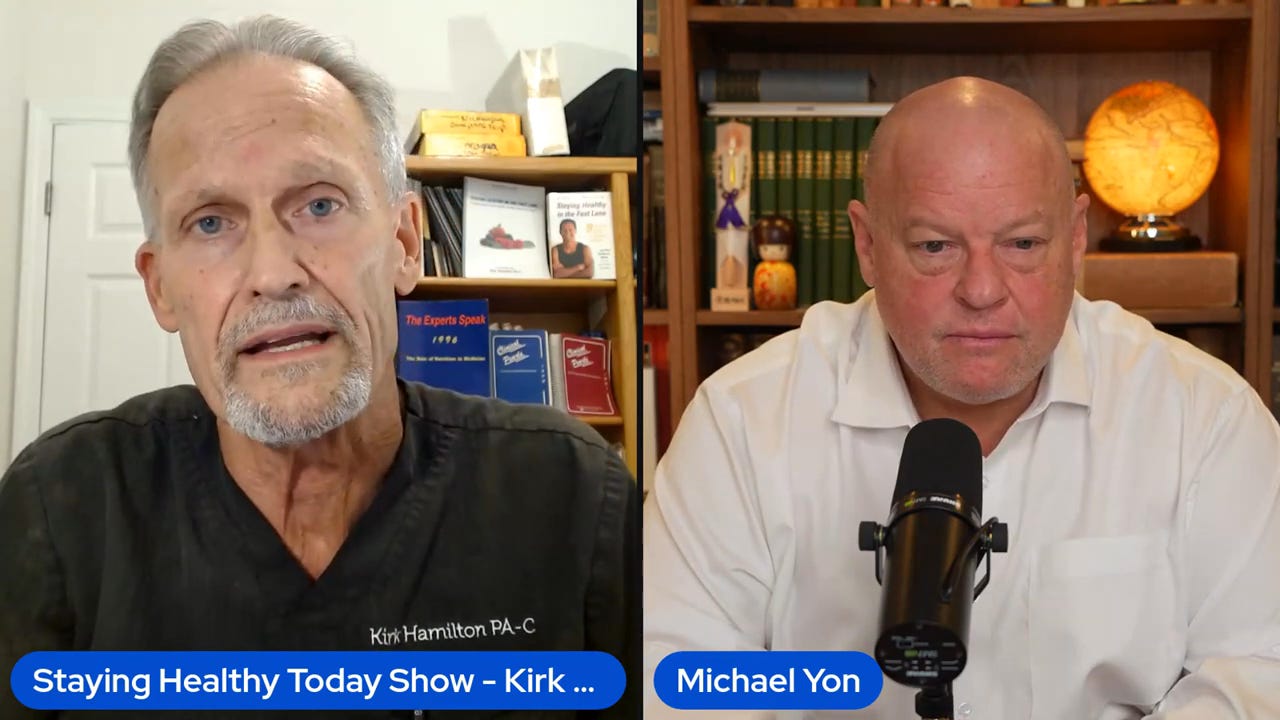Pandemic, Famine, and War are Like the Three Musketeers—Get One and the Others Often Follow. An Interview with Michael Yon, Former Green Beret, Combat Correspondent and GeoPolitical Forcaster...
Description
“War, pandemics, famine—they often travel together. Former Green Beret & war correspondent Michael Yon warns us that today’s energy shocks, fertilizer constraints, bio-ag threats, and information warfare are setting conditions for global food crises. What are the signals—and what can communities and states do now?”Michael Yon, LLCPO Box 66Archer, FL 32618Michaelyon.com MichaelYon.Substack.comAbout - Mission - Supportmichael.yon@gmail.comMichael.Yon@protonmail.com
“From Fertilizer to Information War: Are We Setting the State for Famine...”(Interview transcript summary generated through Otter.AI and ChatGPT then edited by Kirk Hamilton PA)
Interview Overview…Kirk Hamilton and Michael Yon discuss the impending global famine, emphasizing its macro implications. Yon, a former Green Beret and combat correspondent, highlights the strategic use of famine as a weapon of “unrestricted warfare,” citing historical examples like the Irish Potato Famine and the British Victorian famines. He warns of current conditions setting the stage for famine, such as the World Economic Forum’s rewilding initiatives and the disruption of food production systems. Yon argues that large-scale food insecurity typically travels with war and pandemics, and he outlines what he believes are intentional, multi-front attacks on food systems: energy disruptions, fertilizer constraints, bio/ag threats (e.g., screwworms, anthrax), regulatory pressure on ranching, and social/psychological operations.
Yon predicts famine in the U.S., Japan, and Thailand, attributing it to economic and geopolitical strategies. He advises individuals to prepare by avoiding support for harmful policies and individuals while focusing on local food resilience. He criticizes the current organizational structure for exacerbating issues and advocates for a purge of problematic individuals. Yon gives a practical example and suggests that Doc Pete Chambers, a candidate for Texas governor, should focus on assembling a strong team, addressing local issues like water supply and agricultural threats, and purging those hindering progress. He also highlights the negative impact of intoxicants on indigenous communities and the broader geopolitical implications, including the influence of China and the Panama Canal.
Key Themes
* Famine as strategic weapon: War, pandemics, and famine often co-occur; combatants may target food directly or indirectly (energy, fertilizer, transport).
* Energy–fertilizer linkage: Shocks to natural gas and chemical industries can ripple into nitrogen fertilizer shortages, constraining yields. Nitrogen fertilizer shortages are linked to the Haber-Bosch process, which is the industrial method for creating nitrogen fertilizers, and its high reliance on energy, often from natural gas, which is subject to price volatility and supply chain issues. The process is crucial for feeding a large portion of the global population but can also be disrupted by factors like government actions and export restrictions. Recent shortages have highlighted the vulnerability of this system.
* Bio/ag threats: Re-emergence risks (e.g., screwworms), livestock disease certification (e.g., anthrax) can economically hobble regions.
* Policy pressures on beef production: Regulations, land-use changes, and “rewilding” are framed as reducing beef/dairy capacity.
* Information & psychological ops: Narratives, intoxicants, and cultural division are described as tools that soften societies and fragment response.
* Demographic & migration dynamics: Population movements can be used to reshape politics and land control (“routes and resources”).
* Preparedness is systemic: Gardens help, but Yon argues durable resilience requires governance, veterinarians/farmers at the table, water rights, and border/inspection levers.
Practical Takeaways and Action Steps…
* For individuals/communities
* Build local redundancy: stored staples, water plans, ties with local ranchers/farmers.
* Close state roads and conduct truck inspections to stop the diversion of water from the Rio Grande into Mexico (Texas border).
* Skills and networks matter as much as supplies (veterinarians, agronomists, co-ops).
* Be alert to agricultural pests/diseases; report unusual cases to extension/vet channels.
* Identify and purge cowards and traitors from your ranks.
* For state-level policy (as discussed)
* Assemble a team of trusted advisors, including veterinarians, medical doctors, and experienced ranchers/farmers, to address the food security issues.
* Map critical dependencies (fertilizer inputs, feed, processing capacity, power/water).
* Use lawful levers on inspection/transport to respond to treaty or cross-border water issues.
* Monitor and harden against bio-ag threats; maintain certification status (e.g., anthrax-free).
* Protect prime farmland from non-ag conversion; review incentives that displace food production.
* Eliminate “woke” ideology from public schools and shut down cannabis stores.
* Counter the information war and psychological operations being used to demoralize and control the population.
Interview Timeline…
* 0:00 – 2:00 Intro & why “famine” matters to individual health and security
* 2:00 – 6:15 How famine is used in war; historical examples (Ireland, India, Netherlands, U.S. frontier)
* 6:15 – 12:30 “Early signs” concept (Ninomiya Kinjirō (Ninomiya Sontoku) Kinjirō story) and claimed signals in the U.S.
* 12:30 – 21:00 Energy, fertilizer, and industry chokepoints. “Nord Stream,” “BASF,” and “Groningen” are linked through the history of European natural gas supply. The connection highlights Germany’s former reliance on Russian gas via Nord Stream and the shift in European energy policy spurred by the decline of the Groningen gas field and Russia’s invasion of Ukraine.
* 21:00 – 28:30 Food-system shocks: plant fires, livestock diseases, screwworms; vets as key resources
* 28:30 – 36:30 Policy/“green” initiatives, geoengineering claims, and information warfare
* 36:30 – 45:30 Demography, migration, and “routes & resources” framing
* 45:30 – 54:30 China, food security, islands & blockades; Hawaii/Alaska information war claims
* 54:30 – 1:07:15 Diaspora loyalties, meta-networks, and historical genocide lenses
* 1:07:15 – end Preparedness & governance: what a state like Texas should do; agriculture, borders, schools
Notable references mentioned (context only)
* Historical famines (Ireland 1840s; Dutch “Hunger Winter” 1944–45)
* Industrial chokepoints (Nord Stream, BASF, Groningen)
* Books cited by guest: Rape of the Mind (Joost Meerloo), The Basic Laws of Human Stupidity (Carlo M. Cipolla)
Highlights…
Dr McCullough on stage at Wisdom Pearl: Healthspan versus Lifespan, <a href="https://www.americaoutloud.news/author/dr-peter
























